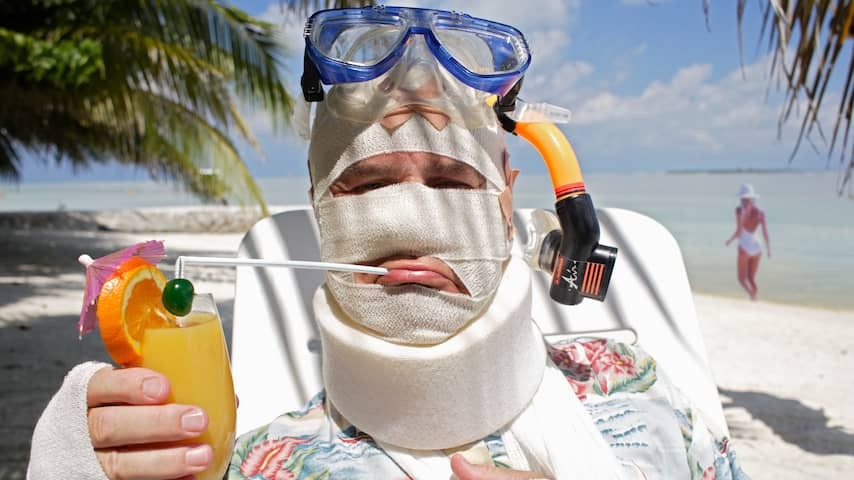
A fall from the water slide, a bite from a stray dog, or a terrible stomach flu; what do you do if you need medical help on vacation? “An unnecessary foreign treatment can leave you deep in debt.”
For departure: check your self-care medication
If you’re already long gone, this tip comes too late, but for the late vacationers: check your first-aid kit. Check whether the nasal spray, paracetamol, ibuprofen, anti-allergy pills, anti-diarrheal drugs and mosquito repellent are not out of date, whether there is still enough in all bottles and check what needs to be supplemented. This prevents a complicated conversation at the counter of the local pharmacy or fatal mistakes.
Always call the emergency center of your travel or health insurer
Don’t try to muddle through on your own, says Angela Looyé from the Eurocross emergency center. A phone call costs nothing and emergency centers have deployed a large number of aid workers at this time of year. The assistance they can arrange for you includes requesting your diagnosis from the local doctor if you have a language barrier or moving you to another hospital if the care is insufficient. They can also find a place where you can go for an acute rabies vaccination.
“Medical misery, therefore. Our aid workers include doctors who speak several languages, which can be very useful. If you break your thumb on vacation and you don’t trust the judgment of the local doctor, we can help you with a hospital nearby where we have good experiences. A call costs nothing.”
Check your travel insurance for medical coverage
People who have to pay tens of thousands of euros for treatment on vacation, get into debt, have to set up crowdfunding… Not being properly insured when traveling can have dire consequences. Looyé gets those people on the phone.
“This year we are speaking to a striking number of holidaymakers who are not properly insured. For example, they do have travel insurance, but not with additional medical coverage. That is a matter of tens of euros and an accident abroad can cost hundreds of thousands of euros.” Your insurer will reimburse your treatment, but only covers the amount that you would also pay in the Netherlands.
Take your complaints seriously before they become really serious
Continuing with a fracture, open wound, bite or a lot of pain is usually not a good idea, says Looyé. Seek expert advice immediately. “Sometimes people don’t trust the care in the holiday country, and they prefer to walk around in pain until they get home.” Not recommended, says Looyé.
“For example, if you are bitten by an animal you can become infected with rabies, which can be fatal. You need treatment immediately. There are many stray dogs in Bali and rabies is a problem. The antibodies are available there. That is much more difficult in South American countries such as Mexico and Colombia, and also in Turkey and Morocco.”
Do you have a lot of pain from a cut or graze? Have it checked. “For example, I had a lot of trouble with a wound on my leg on vacation, but I left it until I was back in the Netherlands,” says Looyé. “There I turned out to have erysipelas. That is a serious bacterial infection of the skin. I had to take antibiotics immediately.”
Your own doctor is – in theory – available
Your own doctor in the Netherlands can think along if you are at your holiday destination. The doctor can email part of your medical file, so that you can go to the local doctor with it. This is especially useful if you have a specific medical history. You can also ask for an e-consultation before you see a local doctor with complaints. If your doctor’s office offers this option, it can also be done from your holiday destination, says the Patients Federation.
Don’t just swallow, smear, sniff or prick anything
What is freely available from us at the supermarket or drugstore is not always on the shelves at foreign stores and drugstores. And vice versa. For example, in some countries outside Europe you can buy antibiotics without a prescription, while here you can only get them with a doctor’s prescription. The same applies to sleeping medication, cough syrup, nasal sprays, painkillers in high doses, hormone ointments or inhalation medicines.
People generally overestimate their own knowledge about self-care medication, states the Royal Dutch Society for the Advancement of Pharmacy (KNMP). Advice from the pharmacist is often needed for these medicines. If you use a remedy that you do not know, whose package leaflet you cannot read and you do not understand the advice properly, this can be a risk. Self-care medications can affect the functioning of medications you use on prescription.